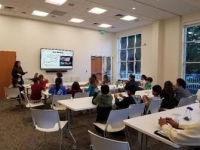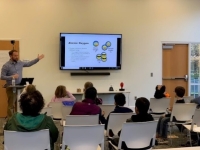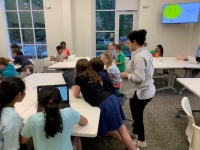STEAM 101: Space Exploration Initiative with MIT
Charlotte Mecklenburg Library, N.C.
Education - Children & Adults
| 2019
Innovation Synopsis
Charlotte Mecklenburg Library worked closely with the MIT Media Lab and Cambridge Public Library to design a prototype curriculum to lead preteens, teens and adults in a six-week workshop series that actively explored the environments of space through learning about Cube Satellite technology.
Challenge/Opportunity
The MIT Media Lab PLIX initiative sought partners in delivering science-based learning experiences. The library volunteered, focusing on developing a learning experience around Cube Satellite technology. Due to budget constraints, there was no way to build or launch a satellite. Instead, the library team prototyped against the following questions:
- Is there a market for focused science-based learning activities?
- Can we showcase this programming in a mixed audience setting?
- Can we drive customers to learn more?
Key Elements of Innovation
Key elements included:
- Challenging the programming norms inherent in our current library programming strategy; our team (made up of the chief innovation officer, teen services leader and makerspace lead) focused on delivering a cumulative learning experience for six weeks
- Working & collaborating with both the MIT Media Lab and Cambridge Public Library to formalize the shared curriculum
- Creating hands-on learning activities with the makerspace and VR to showcase the science behind CubeSats
Achieved Outcomes
Several favorable outcomes came with this prototype programming:
- Project Outcome data on this program indicated that 95% of participants learned something helpful and that 94% were more aware of library services and offerings.
- In addition, 86% felt more confident about what they learned - a positive number given the complexity of the subject matter.
- We attracted an average of 25 participants for each successive program over six weeks resulting in a total of 150 participants.



